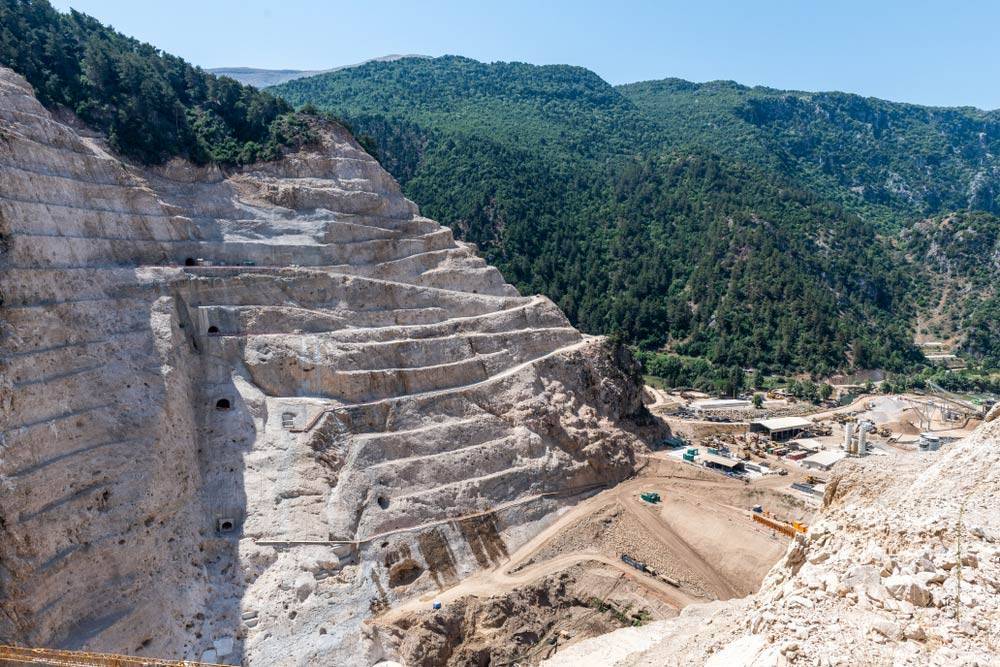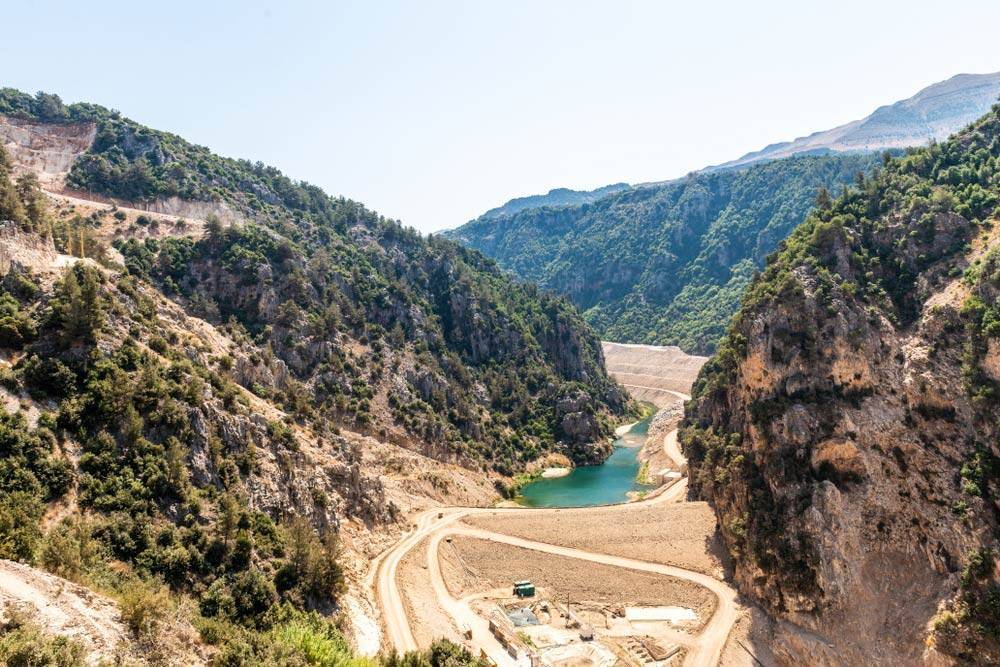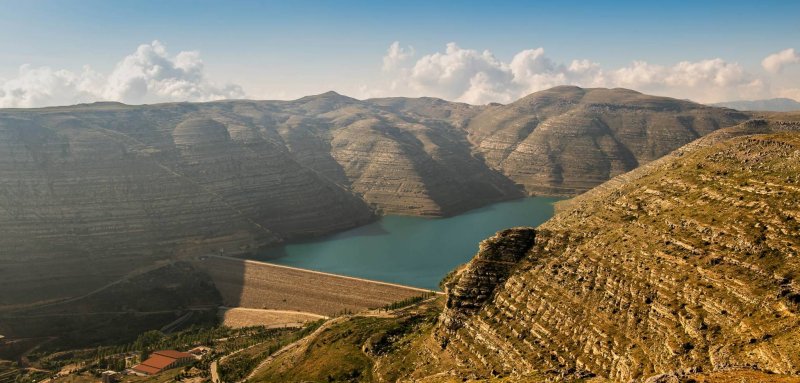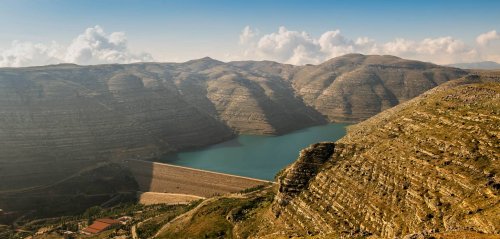The water dams dossier in Lebanon has been one of the most controversial issues in the last ten years. While some advocate for their construction, others describe them as one of the biggest failures in the country, as a result of them not being properly planned, due to corruption and lack of adequate planning, in addition to the “serious” environmental impact and effects that they bring about.
Perhaps what “distinguished” the work of the Lebanese Ministry of Energy in the past ten years the most — besides the lack of electricity, the authority and influence of private generators, and wasting billions on projects that only brought about more darkness — is the problematic dams projects.
Over the past decade, Lebanon has witnessed the construction of several dams meant to collect water and generate electricity. This was accompanied by large campaigns by environmental activists and experts to stop these projects. Some of them succeeded, like what had happened in Marj Bisri nearly two years ago, while others did not succeed, like what had happened in the Mseilha Dam in Batroun, where work began in 2014, and there is still controversy over it to this day, with talk about its lack of proper planning and how it was built on unsuitable mud.
Were these dams really a failure, or were the campaigns filed under the context of political inducements in Lebanon? And what are the alternatives?

Does Lebanon really need dams?
The French described Lebanon as the water reservoir of the Middle East on account of it being rich in renewable groundwater. In this context, human rights and environmental activist Paul Abi Rashed confirms that Lebanon has 3 billion cubic meters of renewable groundwater every year, due to the winter season and melting snow. He points out that the Jordan River originates from Lebanon, and the excess groundwater flows to Palestine and Jordan, and how the surplus of Lebanon’s groundwater also flows to Turkey as it passes through Syria via the Orontes River.
Lebanon is not benefiting from its groundwater as intended, but rather has gone towards dams that aren’t even needed in the first place. Here Abi Rashed asks, “Did we assess the groundwater before building the dams? Of course not. The Ministry of Energy has drawn up a new water plan that goes on to 2030, noting that there is no information and databases to know the volume of the groundwater. How do we build a dam without being fully aware of our need for it? The story is that there was money pouring in from abroad on these projects, and through them, large profits could be made illegally.”
Those who defend the dam projects argue that using up the groundwater would lead to a depletion of the country’s strategic reserves, a guarantee and assurance for future generations. In this context, Abi Rashed stresses that a distinction must be drawn between the renewable groundwater wells and the strategic reserves. Renewable groundwater wells lie within the layers close to the earth’s crust and are refilled every year due to fallen precipitation and melting snow, while the strategic reserves lie within the depths of the earth, after they have been formed over time, and are difficult to replace. He adds, “When we talk about groundwater, we mean renewable, not strategic, and invoking this argument is a red herring, meant to cover up the dam projects.”
The dams’ failure
The karst limestone, chalky nature of the earth in Lebanon allows for the infiltration of huge quantities of water, and in consequence, it would be difficult to contain the water. With this, the idea of constructing dams to collect water becomes useless, and this was confirmed by dozens of geologists over the past years.
Lebanon is rich in water resources. There is no water shortage crisis, and any Lebanese can buy water and fill his tanks whenever he wishes. What Lebanon’s been suffering from is decades of mismanagement of the water sector
In this context, hydrogeological expert Dr. Samir Zaatiti points out, while speaking to Raseef22, that the earth in Lebanon isn’t suitable for the construction of dams, and that the goal of building most dams is making profit to fill the pockets of contractors and beneficiaries. Not to mention the dangers of destroying green spaces, like what has happened with the Beqaatet Kanaan Dam, which led to erosion in the soil that threatened the town and the elimination of the natural species that live in the area.

With the emergence of large cracks in the Beqaatet Kanaan Dam and in the Mseilha Dam, those in charge resorted to filling the gaps with cement and coating them with manufactured chemicals that react with water and the sun, thus polluting the water and soil at the same time and affecting the citizens who use the water. It should be noted that the level of Lake Mseilha had decreased by one and a half meters in less than a month, according to observers, which confirms that the cracks have begun to break once again. Here, Zaatiti says, “Going against the flow of nature only leads to failure.”
The dams violate the law
The dams are part of a national strategy for the water sector, just like when we talk about the strategy for electricity or waste management. This strategy was developed by Minister Gebran Bassil in 2010, and approved by the Council of Ministers in 2012, then a law was issued requiring all strategies in any sector in the country to be subject to a strategic environmental assessment.
Abi Rashed confirms that in 2015, an assessment opposing Bassil’s plan was issued, but Bassil still went ahead with its implementation. The plan included the construction of 40 dams in Lebanon, in an open and blatant violation of the law. Also, the Environmental Impact Assessment Decree No. 8633 of 2012 requires every project that is undertaken by the public and private sectors to be subject to an environmental impact assessment, but the implementation of the Jannah, Buqaata, Mseilha, and Balaa dams began without this study being conducted, which is an explicit violation of the law.
Abi Rashed goes on to say, “We asked about the dams in the Environment Ministry, and it became clear to us that there was no environmental impact assessment made on them. And here, the former Minister of Environment, Mohamad al-Machnouk, must be given his due, as he had taken steps and issued decisions to stop the work on all these dams, but the Ministry of Energy went against the decision of the Environment Ministry, The work continued, and the issue turned into sectarian-based accusations, and that the Sunni community did not want any development done in Christian areas, and of course all of this was in order to pass the deal.”
Alternative solutions
The solution lies primarily in investing the renewable groundwater resources, to reach all the Lebanese people, since this blessing is a right of all citizens and a guarantee for future generations. According to Dr. Zaatiti, the groundwater wells of Fakhreddine and Wadi Jilo in the south are a good example of the importance of this wealth, as these stations nourish dozens of southern towns. He adds, “We discovered that there are very good quantities of water, and dozens of wells were dug in most of the towns, which are now benefiting from the renewable groundwater, after they had been deprived of it for many years, and would depend on collecting drinking water in the winter, or through ponds that had been dug in the towns where rainwater would collect and be used for agriculture, and at that time this was never enough.”
But before starting to dig wells, the following issues must be addressed:
First: The faults in the water networks, which cause 40 to 50% of the water to be wasted, must be repaired, according to what Abi Rached emphasized.
Second: There is an arbitrariness in the way the underground wells are being dug, of which the Ministry of Energy — over many successive governments — has not recorded or counted. Also, it has not shut down the unnecessary, arbitrary, and unlawful ones, and this arbitrariness affects the local rivers and springs

Third: The studies’ findings and recommendations must be taken into consideration, including the German study of the Jeita Spring, which brought forth a solution to increase water for Beirut. They found that the canal from Jeita to Dbayeh wastes 30% of the flowing water and must be fixed. It also recommended building a second canal to draw a larger amount of water to Beirut, according to what was confirmed by Zaatiti.
Fourth: There is a great deal of polluted water, and should be treated using refineries in order to benefit from it. Here, Abi Rashed asks, “Why did the Ministry of Energy not invest in these stations and didn’t pay them any attention or operate them as was necessary, instead of spending money on arbitrary, unnecessary dams?”
Some opinions say that it is possible to establish desalination plants for sea water. In this context, a private source tells Raseef22 that the cost of establishing these stations is high, and they consume large amounts of electric power. Every desalination plant needs a power station. The source adds that this option is not even feasible in the presence of rivers, springs, and groundwater.
The rock in Lebanon isn’t suitable for constructing dams, and the aim of constructing most dams is to fill the pockets of contractors and beneficiaries, oblivious to the destruction of green spaces and soil erosion that threaten nearby towns
What comes next?
Experts speaking to Raseef22 have indicated that extracting water from large underground wells in Lebanon will achieve the country’s self-sufficiency, and may even lead to giving neighboring countries some of these resources. However, it is necessary to address the waste water, which should be treated in refineries for two purposes. The first is to prevent pollution from reaching natural water sources such as springs, groundwater wells, and rivers, while the second is to make use of it for irrigation and household uses, among others, according to Zaatiti.
It must also be noted that solar energy systems should be adopted in order to extract water from these wells and operate the pumps, instead of using costly oil and petroleum products that are harmful to the environment, and also so that the pumps would not stop working, like what is happening nowadays due to the power outages and the scarcity of diesel.
It is clear from this report that Lebanon is rich in water resources, and there is no water shortage crisis. Any Lebanese person can buy water and fill his tanks at any time he wishes to do so, and this is proof of the presence of water. But what Lebanon has been suffering from is decades of mismanagement of the water sector, in addition to the Energy Ministry being sidetracked by projects that bring money to the pockets of contractors but do not bring water to the people, as it engages in dam projects that come at a high financial cost and a frightening environmental cost, while turning a blind eye to projects that will bring water at a lower cost and less damage to the environment.
Raseef22 is a not for profit entity. Our focus is on quality journalism. Every contribution to the NasRaseef membership goes directly towards journalism production. We stand independent, not accepting corporate sponsorships, sponsored content or political funding.
Support our mission to keep Raseef22 available to all readers by clicking here!
Interested in writing with us? Check our pitch process here!






